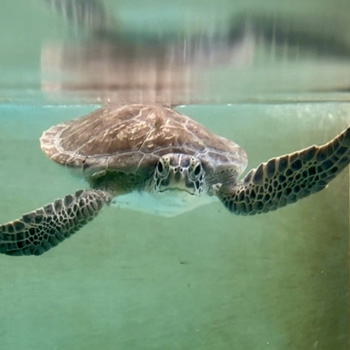Sponsor the Care of Culebra
By sponsoring the care of sea turtle Culebra you'll be supporting the Sea Turtle Hospital and the work we do to research, rehab and release these amazing animals. Your sponsorship can provide Culebra important medical supplies, nutritious food, critical exams and other types of care provided while at the Sea Turtle Hospital.
Suggested amount to sponsor the care of a turtle is $50. We appreciate gifts above $50 as well.
For joining us, you'll receive:
- A personalized certificate and choice to have it mailed to your home or emailed
- A monthly email update
- Advance notice of the turtle’s release (attendance at release not guaranteed)
You can even give a turtle sponsorship as a gift!
Please allow 2 weeks for mailed certificate to arrive. Emailed certificates sent within 3-4 business days.
For questions about sponsoring, please contact wlmb@whitney.ufl.edu.
Culebra's Story
Our 150th Intake of 2025!
We’re excited to introduce you to our 150th patient of 2025—Culebra! This energetic green sea turtle was rescued thanks to the swift actions of the Florida Fish and Wildlife Conservation Commission (FWC).
Culebra was found in a dangerous situation—entangled in monofilament (fishing line) that had wrapped tightly around their body and become caught in the roots of mangroves. The line had ensnared both front flippers, neck, and body, even wrapping around a fibropapillomatosis (FP) tumor on the front flipper and plastron. Fortunately, FWC was able to respond quickly and remove all the monofilament at the scene. In an unexpected silver lining, the entanglement around the FP tumor may have actually made it more accessible for removal—potentially avoiding the need for amputation.
Upon arrival at our hospital, Culebra underwent a comprehensive intake exam, which included bloodwork, X-rays, fluid therapy, and careful wound care. Our veterinary team noted mild constriction wounds on their neck and left front flipper, along with some superficial predatory marks on the carapace—likely from a shark or large fish. Despite the trauma, Culebra showed no signs of pain, just clear distress from the ordeal. Thankfully, radiographs showed no fractures or evidence of hook or line ingestion—another positive sign.
Culebra quickly settled into her rehab tank with no signs of buoyancy issues and immediately began eating a seafood diet—always a great indicator of progress! They even gave us a glimpse of their playful personality by engaging with some of the tank enrichments.
During Dr. Brooke’s full veterinary exam the following day, she confirmed that the predation wounds were superficial, merely grazing the outer keratin layer of the shell. The mild constriction wounds had not broken the skin or compromised circulation—an enormous relief. Overall, aside from the FP tumors and minor injuries, Culebra was in good body condition, with normal bloodwork and stable vital signs.
Next up is FP tumor removal surgery, which we’re hopeful will be a one-time procedure followed by a smooth recovery and, ultimately, release back into the ocean.
Thank you for sponsoring Culebra. Your generous support is helping her recover from a traumatic entanglement and giving them the best chance at a full recovery. We look forward to keeping you updated on their journey with us.
Culebra’s story is a powerful reminder of how harmful marine debris—especially monofilament—can be to the wildlife that call our waters home. Please remember to properly dispose of fishing gear and help keep our oceans safe for all.
